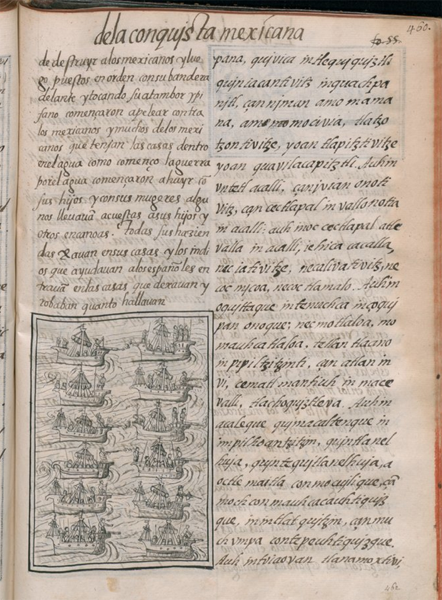Folio 55 recto
Translations and Transcriptions
Spanish Translation
[Translation of the Nahuatl into Spanish by Fr. Bernardino de Sahagún; transcription of the Spanish (left-hand column) by James Lockhart:] [f. 55r.] de destruyr a los mexicanos y luego puestos en orden con su bandera delante y tocando su atambor y pifano començaron a pelear contra los mexicanos y muchos de los mexicanos que tenian las casas dentro en el agua como començo la guerra por el agua començaron a huyr cō sus hijos y con sus mugeres algunos lleuauā a cuestas a sus hijos y otros en canoas. Todas sus haziendas xauan* en sus casas y los indios que ayudauan a los españoles entrauā en las casas que dexauan y robaban quanto hallauan ---------- *XAUAN. For "dexauan."
English Translation
[Translation of the Nahuatl (right-hand column) by James Lockhart:] carrying the guns. A cotton banner came ahead. They were not at all excited or perturbed. They came beating drums and blowing [trumpets] and wooden fifes. And the two boats came gradually, keeping on one side. On the other side no boats came, because there were houses there. They came ahead, fighting as they came; there were deaths on both sides, and on both sides captives were taken. When the Tenochca who lived in Çoquipan saw this, they fled, fled in fear. The little children were taken along with the others. They just went into the water; the water was full of people, and a wail arose. And those with boats put their children in them and poled them along, working vigorously. They took nothing at all with them, they just left all their poor property in fear, they just scattered everything in their haste. And our enemies went snatching things up, [Translation of the Spanish (left-hand column) by James Lockhart:] to destroy the Mexica. Then, arranged in order, with their banner at the front and playing their fife and drum, they began to fight against the Mexica. When the battle began on the water, many of the Mexica who had their houses in the water began to flee with their wives and children. Some carried their children on their backs, others in canoes. They left all their belongings in their houses, and the Indians who were helping the Spaniards went into the houses they had left and stole whatever they found.
Analytic Transcription
[Transcription of the Nahuatl (right-hand column) by James Lockhart:] [f. 55r.] pana, quivica in tlequiquiztli quiniacantivitz in quachpanitl, çan niman amo mamana, amo momocivia, tlatzotzontivitze, yoan tlapitztivitze yoan quavilacapitztli. Auh in vntetl acalli, çan ivian onotivitz, çan cectlapalin vallonotia in acalli: auh in oc cectlapal atle valla inacalli, iehica ca calla, nec iativitze, necalivativitz, necoc micoa, necoc tlamalo. Auh in oquittaque in tenuchca inçoquipan onoque: nec motlaloa, momauhcatlaloa, tetlantlaano in pipiltzitzinti, çan atlan in vi, cematl mantiuh in macevalli, tlachoquiztleva. Auh in acaleque quimacaltenque in impilhoantzitzin, quintlanelhuia, quintequitlanelhuia, aoc tle ma itla conmocuiliquintlatquitzin, çan much vmpa contepeuhtiquizque. Auh in toiaovan tlanamoxtivi,
Image

Spanish Translation
[Translation of the Nahuatl into Spanish by Fr. Bernardino de Sahagún; transcription of the Spanish (left-hand column) by James Lockhart:] [f. 55r.] de destruyr a los mexicanos y luego puestos en orden con su bandera delante y tocando su atambor y pifano començaron a pelear contra los mexicanos y muchos de los mexicanos que tenian las casas dentro en el agua como començo la guerra por el agua començaron a huyr cō sus hijos y con sus mugeres algunos lleuauā a cuestas a sus hijos y otros en canoas. Todas sus haziendas xauan* en sus casas y los indios que ayudauan a los españoles entrauā en las casas que dexauan y robaban quanto hallauan ---------- *XAUAN. For "dexauan."
English Translation
[Translation of the Nahuatl (right-hand column) by James Lockhart:] carrying the guns. A cotton banner came ahead. They were not at all excited or perturbed. They came beating drums and blowing [trumpets] and wooden fifes. And the two boats came gradually, keeping on one side. On the other side no boats came, because there were houses there. They came ahead, fighting as they came; there were deaths on both sides, and on both sides captives were taken. When the Tenochca who lived in Çoquipan saw this, they fled, fled in fear. The little children were taken along with the others. They just went into the water; the water was full of people, and a wail arose. And those with boats put their children in them and poled them along, working vigorously. They took nothing at all with them, they just left all their poor property in fear, they just scattered everything in their haste. And our enemies went snatching things up, [Translation of the Spanish (left-hand column) by James Lockhart:] to destroy the Mexica. Then, arranged in order, with their banner at the front and playing their fife and drum, they began to fight against the Mexica. When the battle began on the water, many of the Mexica who had their houses in the water began to flee with their wives and children. Some carried their children on their backs, others in canoes. They left all their belongings in their houses, and the Indians who were helping the Spaniards went into the houses they had left and stole whatever they found.
Analytic Transcription
[Transcription of the Nahuatl (right-hand column) by James Lockhart:] [f. 55r.] pana, quivica in tlequiquiztli quiniacantivitz in quachpanitl, çan niman amo mamana, amo momocivia, tlatzotzontivitze, yoan tlapitztivitze yoan quavilacapitztli. Auh in vntetl acalli, çan ivian onotivitz, çan cectlapalin vallonotia in acalli: auh in oc cectlapal atle valla inacalli, iehica ca calla, nec iativitze, necalivativitz, necoc micoa, necoc tlamalo. Auh in oquittaque in tenuchca inçoquipan onoque: nec motlaloa, momauhcatlaloa, tetlantlaano in pipiltzitzinti, çan atlan in vi, cematl mantiuh in macevalli, tlachoquiztleva. Auh in acaleque quimacaltenque in impilhoantzitzin, quintlanelhuia, quintequitlanelhuia, aoc tle ma itla conmocuiliquintlatquitzin, çan much vmpa contepeuhtiquizque. Auh in toiaovan tlanamoxtivi,
Image
